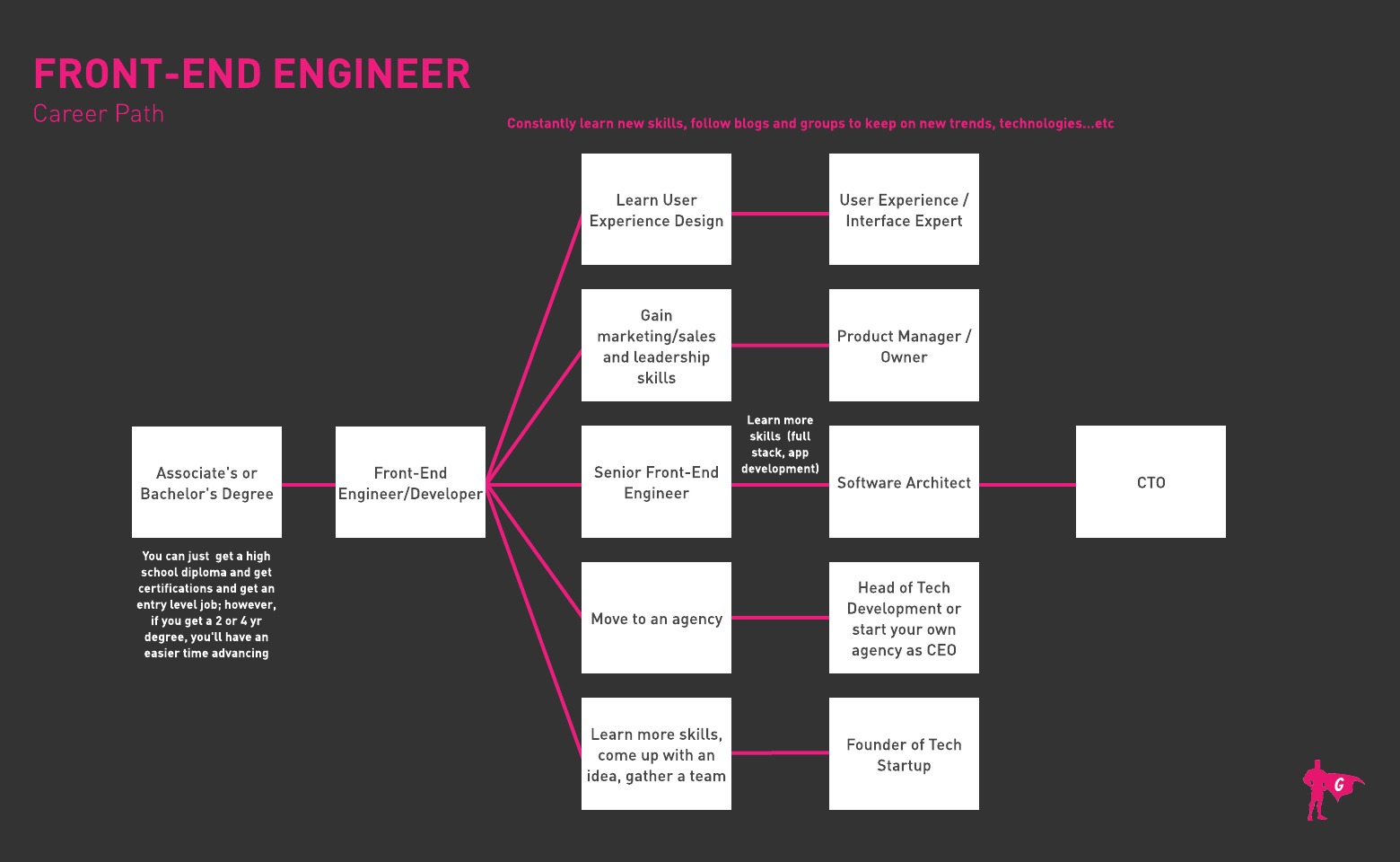Spotlights
Front-End Developer, Web Developer (Front-End), UI Developer, User Experience (UX) Developer, Front-End Software Engineer, Front-End Architect, JavaScript Developer, React Developer, Angular Developer, Vue.js Developer, CSS Developer, HTML Developer, UI/UX Engineer, Front-End Designer, Front-End Development Specialist
Websites don’t build themselves (yet). They require careful foreplanning by experts who develop the framework and technical features, mostly done by Back-End Developers. There are also Front-End Web Developers or Engineers, who design and choose elements for users to interface with.
Generally speaking, they’re in charge of how the site looks, based on customer specifications. Depending on the scope of the job, they’ll work with a team to ensure the client’s vision is met. Increasingly clients demand sites that are lean and mobile-friendly.
Front-end Engineers are masters at creating effective layouts utilizing relevant graphics and content while incorporating specific functional elements such as purchase check-out features. This requires strong knowledge of applicable languages like HTML, CSS, and JavaScript. Job prospects are strong, with demand expected to rise in the coming years.
AI agents can generate UI components and front-end code from prompts, accelerating development workflows. However, understanding user experience, accessibility, and product strategy remains deeply human. Front-end engineers who combine design thinking with AI fluency will stand out.
- Exploring computer language possibilities to create customized sites for clients
- Helping companies become more successful through a strong online presence
- Building exportable skills that are in high demand and can be put to use anytime, anywhere
Working Schedule
- Qualified Front-End Engineers’ schedules depend on their employer. Many work regular full-time jobs in offices, while others work from home on a contract basis. This career field includes many freelancers, including ones who reside overseas. In some cases, workers outside the US are able to offer lower rates due to the difference in currency exchange rates. All workers in this field must expect overtime hours when projects require meeting tight deadlines or when problems come up.
Typical Duties
- Meeting clients, project managers, potentially User Experience and User Interface designers, and Back-End Developers to brainstorm website design and content ideas
- Discussing all of the required branding elements, content, graphics, audiovisual components, animations, desired functions, and other issues
- Planning the work needed for existing website overhauls and upgrades
- Building prototype concepts and crafting graphics for review and feedback, based on inputs from other team members and clients
- Creating applicable code using a variety of languages to bring plans to life
- Additional Responsibilities
- Conducting extensive testing to ensure code operates as desired; adjusting as needed
- Knowing which team members are involved in any given project, and their roles and responsibilities
- Backing up files in case of problems
Soft Skills
- Strong listening skills
- Attention to detail
- Good phone and email etiquette
- Customer service skills
- Professional demeanor
- Team-orientation
- Goal-focused
- Patient; ready to tackle challenges
- Analytical, critical thinking
- Creative, artistic, and flexible
- Familiarity with other team roles, such as content creators and SEO specialists
- General awareness of psychology and how users engage with sites
- Able to take feedback and criticism
- Organized with excellent time-management skills
Technical Skills
- Practical, hands-on experience with HTML/CSS, JavaScript languages
- Varying degrees of expertise with:
- jQuery
- CSS and JavaScript frameworks (such as Bootstrap and AngularJS)
- CSS Preprocessors (like Sass, Less, Stylus, etc.)
- Version control software (Git)
- Responsive design
- Testing and debugging programs (such as Mocha or Jasmine)
- Browser developer tools; Building/Automation tools
- Web performance (Grunt, gulp)
- Command line
- Knowledge of fast-moving trends related to website design and branding
- Understanding of social media app interaction and sharing features
- Willing to upskill as needed
- Computer systems design agencies
- Publishing
- Advertising
- Management consulting firms
- Large companies and organizations
- Healthcare industries
- Governmental agencies
- Self-employed
Virtually every organization in the world has some sort of online presence at this point, with unique websites being the norm. Technology has come a long way since the first mostly-text websites like CERN, Acme Labs, World Wide Web Worm, and Doctor Fun. Companies want high-speed, cutting-edge sites that grab your attention and hold onto it as they convert you from reader to paying customer.
Non-corporate sites also want compelling designs that can effectively provide whatever their users are looking for. The pressure on Front-End Engineers can be massive, depending on the scope of the site’s purpose. That is why it is critical for workers to test and debug before launch, and to work closely with other members of the team to ensure the site is secure and can handle the expected traffic. Hackers are constantly on the lookout for vulnerabilities to exploit, to either crash sites, plant viruses, or steal information.
Tech never stops changing and evolving, which is why web developers need to stay current on trends. From micro frontends to Atomic Design, there is a flood of innovations heading down the pipeline that Front-End Engineers should get on top of. Certifications may not keep up with the boots-on-the-ground changes, so it’s important to keep track by reading and networking with peers.
Online shopping has skyrocketed in recent times, forcing many businesses to make major shifts in their operations that require significant website upgrades. Sites must also be mobile-friendly, which wasn’t always been the case in the past. As foreign workers compete for jobs, it’s important to sharpen English and other communication skills in order to gain or maintain a competitive edge over cheaper labor.
Front-End Engineers work indoors a lot, and often alone. Many started out with an early interest in computers and technology in high school or before. There’s an emphasis on elegant design, which is why artistic personalities are often drawn to this field. Many workers have a keen sense of visual aesthetics and were probably interested in art, design, and multimedia projects, and may have enjoyed making videos or building hobby blogs and websites on GoDaddy, WordPress, or Wix.
Although there’s ample time spent on one’s own, this job requires plenty of group effort and teamwork. Such collaborative skills are often honed during school or extracurricular activities. Employees must be eager partners, not rigid thinkers who want to “do everything their way.”
In their free time, Front-End Engineers have likely always had a passion for learning new things and taking the initiative to master their skillsets without being told that they have to. In other words, they genuinely love their work! Possessing a well-developed sense of empathy, they can also put themselves in the shoes of managers, owners, clients, and other end users...an ability which may have been cultivated during childhood.
- Front-End Engineers often hold a bachelor’s degree in Computer Science or programming, but this isn’t always required
- Per O-Net Online, 46% of Web Developers have an undergraduate degree, 17% have a post-secondary certificate, and 17% have an associate’s
- Web design is a popular associate’s degree option
- Graphic design courses are important for many positions
- Practical work experience is usually as important as academics. Workers must know HTML, JavaScript, and have other programming and software skills as referenced above
- Employers are interested in seeing evidence of required soft skills, and not just technical abilities, so don’t neglect your English, writing, speaking, and management classes
- Learn on your own with the following:
- LinkedIn Learning’s Become a Front-End Developer
- Udacity’s Front-End Web Developer Nanodegree Program
- CompTIA’s IT Fundamentals
- Vendor/tech-specific certifications such as Google Cloud, RedHat, Microsoft (MTA, MSCA, MSCE)
- Udemy:
- The Web Developer Bootcamp
- The Complete Web Developer in 2019 : Zero to Mastery
- Coursera:
- Web Design for Everybody
- Duke’s Programming Foundations with JavaScript, HTML and CSS
- Skills Brief: Front End Development
- Some suggest the best Front-End Engineer degree is Computer Information Systems
- Check out U.S. News’ annual rankings of Best Computer Science Programs and Best Programming Language Programs
- Classes in both front- and back-end design can be helpful, along with project management and database design
- Save time shuffling from class to class by enrolling in an online or hybrid program
- Ensure the institution is fully accredited
- Learn on your own. Most of the basic skills needed to get started can be gained for free or for very little money (see our Education and Training recommendations above, and more Recommended Websites list below)
- Keep a portfolio of projects you completed, along with notes of what you did to achieve those results
- Volunteer to help your school or other associations with their websites
- Find internships that offer practical work experience opportunities
- When you’re good enough, hop on Upwork and start building your freelance credentials
- Join computer clubs to network with others and help teach each other skills and tricks
- Polish your customer service and communication skills with related coursework
- Always keep up with emerging tech and current trends
- Read popular Quora authors who write about the field, and ask them questions

- Set up job alerts on employment portals such as Indeed, Monster, and Glassdoor
- Ask your college department or school career center for help finding openings
- Closely scan job postings for required skills, training, and experiences
- Take a hard look at the qualities employers are looking for in new Front-End Engineers
- Honestly tailor your application to match everything that employers are seeking
- Let employers view your portfolio by adding links on your resume
- Make your online portfolio professional, listing specialized tech skills, personal projects, and links to any projects on GitHub, CakeResume, or CodePen
- Give context regarding each item (the who, what, where, when, and why details)
- Ensure the portfolio itself is a showcase of your talent!
- The more programming experience you have, the better you’ll be positioned against the competition
- Remember, not every job requires a degree. If you don’t have one, read job postings to see if other experience can be substituted for formal education
- Be concise but don’t be afraid to list technical details on resume; check out Medium’s “How to Write a Front-End Developer Resume That Will Land You an Interview”
- Don’t forget those soft skills! Show them off on the application and in interviews
- Get a second opinion! Ask someone to review your resume and portfolio
- Ask teachers/supervisors if they know of job openings or will be references for you
- Talk with your supervisor and managers, to get advice and let them know you’re interested in doing what it takes to qualify for promotion opportunities
- Know what types of intermediate roles you want to climb to, such as Software Developer, Application Developer, or Senior Web Developer
- Also start planning for advanced roles like Senior Developer, Software Development Engineer, or Software Architect
- Keep your tech skills sharp by completing advanced certifications
- CompTIA lists applicable certs for various stages of your career development
- If you don’t have your bachelor’s degree yet, consider finishing it. Then start on your master’s, if you want to keep moving up
- Do excellent work on every project and earn rave reviews from clients
- Always meet deadlines, but not at the expense of quality
- Study new design trends and stay inspired!
- Get published online and in-print. Write articles for industry print mags like Net, How, Layers, Computer Arts, Digital Arts, Web Designer, CMYK, and others
Websites
- Association for Computing Machinery
- Brilliant
- Bureau of Labor Statistics’ Occupational Outlook Handbook
- CodeSignal
- Codewars
- CodinGame
- CompTIA
- CompTIA Association of IT Professionals
- Coursera
- edX
- Exercism
- freeCodeCamp
- Frontendmasters
- HackerEarth
- HackerRank
- Javascript30
- Rithm School
- Udemy
- W3Schools: Javascript
- World Organization of Webmasters
Books
- Web Design with HTML, CSS, JavaScript and jQuery Set, by Jon Duckett
- Front-End Web Development: The Big Nerd Ranch Guide, Big Nerd Ranch Guides
- Web Coding & Development All-in-One For Dummies, by Paul McFedries
- HTML, CSS, and JavaScript All in One, Sams Teach Yourself, by Julie C. Meloni and Jennifer Kyrnin
- The Full Stack Developer, by Chris Northwood
There are numerous jobs for people who love working with computers. Front-End Development is a popular one, but it’s not the right fit for everybody. BLS lists options to think about, depending on your interests and aptitudes:
- Computer and Information Systems Managers
- Computer Programmers
- Computer Support Specialists
- Computer Systems Analysts
- Database Administrators
- Graphic Designers
- Information Security Analysts
- Multimedia Artists and Animators
- Software Developers
- You might also consider Software Quality Assurance Engineering or Web Administration.
Newsfeed

Programs at Foothill
Featured Jobs

Online Courses and Tools













